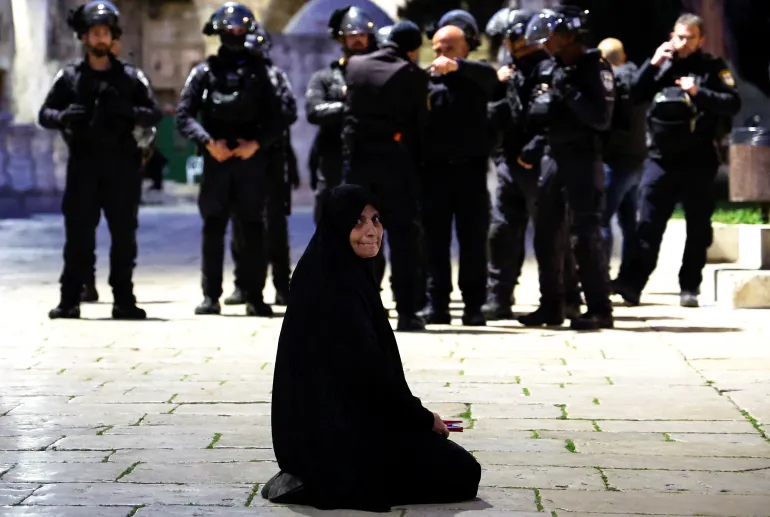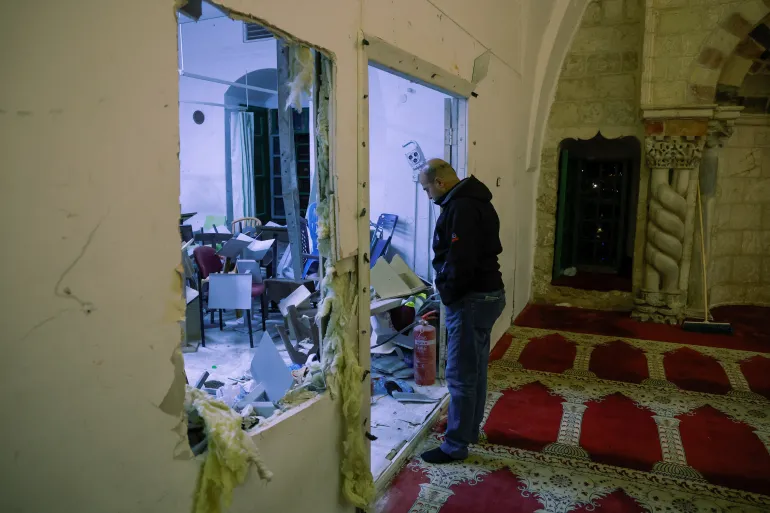Following a night of devotion in Al-Aqsa Mosque, Israeli troops captured hundreds of Palestinians.
Occupied East Jerusalem – Following Israeli soldiers’ raids overnight on Palestinian Muslim worshippers who were in the Al-Aqsa Mosque following nighttime tarawih prayers, the city of Jerusalem is still tense.
In order to ease tensions after Israel’s government came under fire for the actions of its forces, international efforts are being undertaken to mediate between Palestinian organizations and the Israeli government.
Images of Israeli troops dragging and assaulting worshippers to force them out of the mosque circulated as the raids continued into the morning, just before the site, which Muslims refer to as al-Haram al-Sharif, was made open to non-Muslim visitors.
Al-Aqsa Mosque, the third holiest site in Islam, and the Dome of the Rock, where it is thought that the Prophet Muhammad’s ascension to heaven took place, are both located in Al-Haram al-Sharif. Jews refer to the area as Temple Mount because they think that is where the Biblical Jewish temples originally stood. Despite the fact that traditional Judaism forbids prayer there, the compound has long been a source of conflict.

On April 5, 2023, a Palestinian woman sits next to Israeli border guards in the Al-Aqsa compound. [Reuters/Ammar Awad]
During the holy month of Ramadan, Al Jazeera spoke with some of the Palestinian worshippers who were present inside the mosque about their encounter and why being ejected from it was so upsetting.
Violating our sacred sites
Itikaf, or seclusion from the outside world while engaging in extended periods of prayer and meditation, is a part of the Muslim religion. Its duration may last for many days.
The Prophetic tradition states that the ideal length of an i’tikaf during the holy month is 10 days, which has led many devout Muslims to feel that i’tikaf during Ramadan is particularly auspicious.
The Al-Aqsa Mosque is a revered symbol of Islam religion for Palestinians. During Ramadan, it is also the only area that Palestinian Muslims seek to worship in Jerusalem.
“Ramadan includes itikaf. Every day throughout Ramadan, as well as many nights, I am at Al-Aqsa, 29-year-old Amir Maragha of Jerusalem’s Silwad neighborhood told Al Jazeera.
“Raids reduce when there are many worshippers at Al-Aqsa. To stop the raids, some people remain inside the mosque, he claimed.

On April 5, 2023, a man surveys the Al-Aqsa Mosque’s destruction. [Reuters/Ammar Awad]
Israeli police stated in a statement released following the raid that they had been “forced” to enter the property because “masked agitators” with pyrotechnics, sticks, and stones barricaded themselves inside the mosque.
A big group of agitators, according to the statement, “fired fireworks from within the mosque and threw stones at the police as they approached.”
Maragha claimed that the police “always attack with force to stop people from staying in the mosque.” The settlers can enter the compounds unimpeded the following day because it is secure for them to do so.
“They were bleeding, suffocating, and fainting,”
An i’tikaf for Ramadan was being held at the mosque that evening, and Bakr Owais, a 24-year-old student at Birzeit University, was present as well. He and the other worshippers there were astonished to see the doors closed and everyone inside.
The worshippers were warned by the security personnel stationed on the mosque’s roof that they had to leave or else they would be forcibly removed.
The youth in the mosque made the decision to rebel at that point because they did not want their i’tikaf to be cut short in order to prepare the area for settler visits the next morning. The security forces made the decision to enter.
They started shooting stun grenades at us after breaking the mosque’s windows. Little children, elderly men, and women were trapped inside, according to Owais, who spoke to Al Jazeera.
“Another group entered through a door and began shooting rubber-coated bullets, stun grenades, and tear gas at the crowd.
They attacked the people and beat them with sticks on the head. They were bleeding, dizzy, and suffocating. Suddenly they began detaining us. Many individuals were abducted. They pushed us onto buses that transported us to the police station in Atarot, where we were forced to lie on the floor with our wrists bound behind us while they cursed at us the entire time.
“There had to be 400 or 500 prisoners. As if we were useless, they took our names, stuck a sticker with our names and numbers on us, and called us in by the number, he claimed.
Owais has a week-long entry ban into Al-Aqsa, along with every other Palestinian detained during the operation.